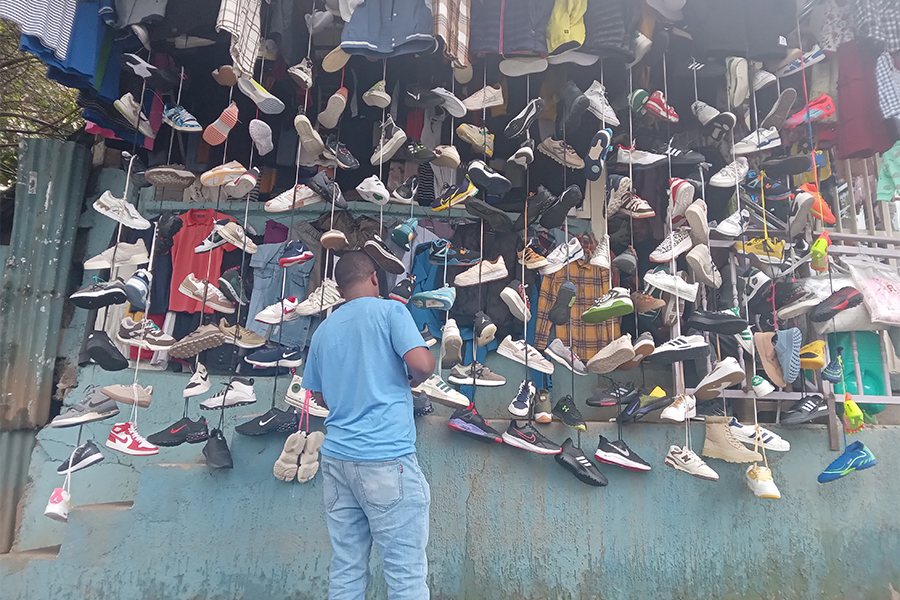
Delicate Number | May 31,2025
A struggle is brewing between workers, trade union leaders, and the management of one of India's largest textile manufacturing firms in the Bole-Lemi Industrial Park.
Jay Jay Textile Plc's staunch posturing against trade unions has sparked a broader debate over labour rights and industrial growth in a country where manufacturing contributes less than seven per cent to GDP. Several factories housed in the industrial parks are seeing their union certification efforts derailed, prompting leaders of the Industrial Federation of Ethiopian Textile Leather & Garment Worker Trade Union to submit a contentious three-page letter to the Addis Abeba Labor Enterprise & Industry Bureau.
However, experts urged that labour unions could help achieve industrial peace if established in ways to address employers' concerns.
In this missive, the Federation’s leaders detailed their unsuccessful attempts to unionise workers and urged the possibility of adopting alternative measures.
Angesom Gebreyohannes, the Federation’s president, acknowledged that proceeding with union formation could spark tension between management and workers. Instead, he outlined an alternative strategy of forming alliances with international buyers, particularly in the United States (US), to boycott products made by companies disregarding labour rights.
"We'll be using this bargaining chip," Angesom said, emphasising the Federation's growing frustration with the situation.
The discord in the textile industry, particularly at Jay Jay Textiles, has involved several entities, including the Confederation of Ethiopian Trade Union (CETU), the Ethiopia Investment Commission (EIC), and the Industrial Park Development Cooperation (IPDC). However, their collective efforts have so far proven futile.
CEO of Jay Jay, Karuprayil Purushothaman Raju, remains opposed to union formation, arguing that unions often encourage strikes and demand unreasonably high worker privileges, leading to a plunge in company productivity.
"Experiences of other countries prove likewise," said Raju, referring to instances where unionisation resulted in operational disruptions.
Despite its modest contribution to Ethiopia’s economy and accounting for only five per cent of total export revenues, the manufacturing sector has seen a recent 24pc downturn (118 million dollars), a worrying trend for this emerging sector. Jay Jay Textile, a company specialising in children's apparel, commenced operations in Ethiopia in 2014. It reported a dip in revenue to 22 million dollars following Ethiopia’s delisting from the African Growth & Opportunity Act (AGOA), leading to a 10pc downsising in the workforce of 8,000.
"Revenue has been falling nearly a quarter yearly," Raju lamented to Fortune.
He sees the Federation's demands for union formation as unwarranted since the employees were content with the existing Workers’ Council established by the company.
"We can't have someone from outside tell us what to do," he told Fortune.
An investigation by the Worker Rights Consortium (WRC) - released in 2018 - accused Jay Jay Textile of "unfavourable work conditions". The report exposed wage deductions, excessive overtime, inadequate breaks, limited restroom facilities, and substandard meals. It revealed cases of workers collapsing from exhaustion at their workstations.
Angesom argued that these circumstances underscore the need for effective worker representation, particularly in the absence of a minimum wage law. He views trade unions as a crucial tool for improving collective bargaining power.
"Trade unions are a safety net to create a strong bargaining power," he said.
However, despite the Federation’s persistent efforts, Jay Jay's management remains defiant, as evidenced by their letter to the International Labour Organization (ILO). They argue that the company's existing Workers' Council fulfils their obligations, making trade unions unnecessary, and further, the Federation lacks authority to demand the establishment of a union.
In response, ILO officials reiterated their mission to urge Ethiopian authorities to fulfil the country’s commitment to the national labour rights conventions they signed, although they do not take legal action.
"We only convey the law," an official told Fortune.
Other companies in the industrial park, including Ashton Apparel Manufacturing Plc and Shang-Tex Garment Manufacturing Plc, have reportedly used Jay Jay’s resistance to unionisation as a precedent to deny unions accreditation from the Addis Abeba Labor Enterprise & Industry Bureau.
The Bureau has granted accreditation to six of the factories at the industrial park. According to Tibebu Lema, a union advisory expert for the Bureau, they negotiate during such cases with mandates that extend to taking the cases to court for permanent closure.
"Associate is a constitutional right," he said.
Bole Lemi Industrial Park, built on a sprawling 350hct land, is now the epicentre of the labour unrest, hosting approximately 22,000 workers employed by nine textile and garment factories; 83pc of the labour force is women.
Despite ongoing discussions between the General Manager of the Park, Tinsae Yimam, and Jay Jay’s management, no progress has been made until our press time on late Saturday.
"The discussions are ongoing," he told Fortune.
According to Tinsae, the Park's overall production has been affected by external factors such as the suspension from AGOA and the impact of Russia's war in Ukraine. However, he reported a 26pc increase in export revenues from last year, amounting to 65.3 million dollars.
Ethiopia's strategy of offering the lowest wages in the global garment industry to attract foreign investment has led to establishing 20 industrial parks, 14 of which are operational. Yet, these low wages, coupled with strenuous working conditions, have left employees struggling to make ends meet.
An employee at Jay Jay Textile, who demanded to remain anonymous due to fear of losing her job, earns 2,000 Br a month.
"This can never be enough," she said of her income.
She is aware that the management had shrugged off the demand for a trade union, claiming that the Workers’ Council had already been established.
Kibur Engidawork (PhD), a researcher, argued that while employers often fear trade unions due to potentially tasking negotiations for collective agreements, unions could also foster workers’ responsibility and productivity. However, he cautioned that a union would only be beneficial if it genuinely enhanced bargaining power for workers.
"It is a means to an end," he said, "not an end to itself."
He suggested that creating awareness among employers about the potential benefits of trade unions might address their concerns.
Kibur argued that understanding trade unions in the context of economic, social, and political dynamics could lead to a more balanced relationship between management and employees.
PUBLISHED ON
Aug 05,2023 [ VOL
24 , NO
1214]

Delicate Number | May 31,2025

Advertorials | Dec 19,2023

Radar | Feb 26,2022

Radar | Sep 14,2024

In-Picture | Sep 14,2024

Life Matters | Jun 28,2025

Commentaries | Oct 03,2020

Fortune News | Jun 13,2025

Radar | Nov 21,2018

View From Arada | Aug 13,2022

Dec 22 , 2024 . By TIZITA SHEWAFERAW
Charged with transforming colossal state-owned enterprises into modern and competitiv...

Aug 18 , 2024 . By AKSAH ITALO
Although predictable Yonas Zerihun's job in the ride-hailing service is not immune to...

Jul 28 , 2024 . By TIZITA SHEWAFERAW
Unhabitual, perhaps too many, Samuel Gebreyohannes, 38, used to occasionally enjoy a couple of beers at breakfast. However, he recently swit...

Jul 13 , 2024 . By AKSAH ITALO
Investors who rely on tractors, trucks, and field vehicles for commuting, transporting commodities, and f...

Oct 18 , 2025
The political establishment, notably the ruling party and its top brass, has become p...

Oct 11 , 2025
Ladislas Farago, a roving Associated Press (AP) correspondent, arrived in Ethiopia in...

Oct 4 , 2025
Eyob Tekalegn (PhD) had been in the Governor's chair for only weeks when, on Septembe...

Sep 27 , 2025
Four years into an experiment with “shock therapy” in education, the national moo...